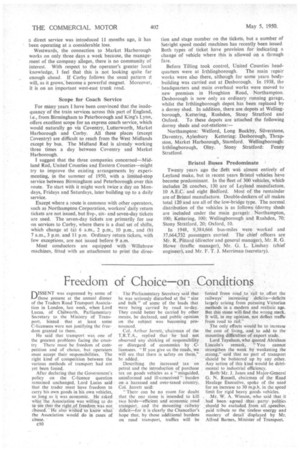Freedom of Choice—on Conditions D ISSENT was expressed by some of
Page 46

If you've noticed an error in this article please click here to report it so we can fix it.
those present at the annual dinner of the Traders Road Transport Association in London, last week, when Lord Lucas, of Chilworth. Parliamentary Secretary to the Ministry of Transport, hinted that at least some C-licensees were not justifying the free
dom granted to them. .
He said that transport was one of the greatest. problems facing the country There must be freedom of competition and of choice, but operators must accept their responsibilities. The right kind of competition between the various methods of transport had not yet been found.
After declaring that the Government's policy on the C-licence question remained unchanged, Lord Lucas said that the trader must have freedom to carry his own goods in his own vehicles, so ,long as it was economic. He asked what the Association was:willing to do to See that the'right,of freedomt was not abused. He also wished to knoW what the Association would do in cases of abuse. '
c 10
'.The Parliamentary Secretary said that he was seriously disturbed at the "size and bulk" of some of the loads that were being carried by road to-day. They could better be carried by other means, he declared, and public opinion on the subject wasbecoming pronounced.
Col. Arthur Jerrett, chairman of the T.R.T.A., replied that -lie. had not observed any shirking of responsibility or disregard of economics by C
licensees. If you give us the roads, we will see. that there is safety on them," he added.
Describing the increased tax ' on petrol and the introduction of purchase tax on goods vehicles as a"misguided, uninformed and ill-conceived" burden on-a • harassed and over-taxed country, Col. Jerrett said: "There can be no room for doubt that the one stone is intended, to kill two birds—efficient. and economic road transPOrt. and the Mounting railway deficit—for 'it -is clearly the Chancellor's hope that, by those additional burdens on road transport, traffics will be
forced from road to rail to. offset the railways' increasing deficits—deficits largely arising from pursuing Victorian methods in a modern and realistic age. But this stone will find the wrong mark. It will, in my opinion, not deflect traffic from road to rail."
The only effects would be to increase the cost of living, and to add to the mounting difficulties of export trade.
Lord Teynham, who quoted Abraham Lincoln's remark, "You cannot strengthen the weak by weakening the strong," said that no' part of transport should be bolstered up by any ,other. Any action of this kind would be detrimental to industrial efficiency.
Both.Mr. J. Janes and Major-General G. N. Russell, chairman of the Road Haulage Executive, spoke of the need for an increase to 30 m.p.h, in the speed limit for rigid heavy goods vehicles.
.Mr W. A. Winson,-who said that it had been agreed -.that party polities should be excluded from all speeches, paid tribute to the tireless -energy and mastery of detail displayed by Mr. Alfred Barnes, Minister of Transport.
























































































